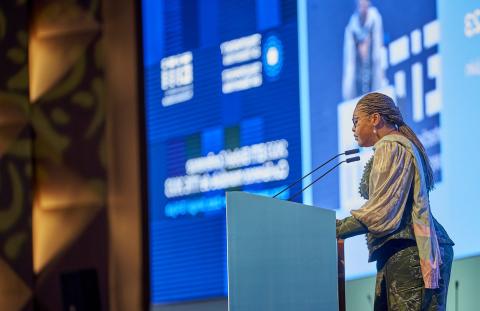Overview of the extractive industries
3.1 Exploration data
Requirement:
Exceeded
100
The Secretariat’s assessment is that Requirement 3.1 is exceeded. This confirms the previous Validation and stakeholder impressions that public information provides a good overview of oil and gas exploration in Norway.
The Norwegian Petroleum website provides a comprehensive overview of the extractives sector, including information graphics and charts, interactive maps, and historical narratives ( https://www.norskpetroleum.no/en/). The site also provides detailed information on exploratory licenses, the companies that have been granted exploratory licenses, and active exploration wells, as well as original and remaining reserves by field. This information is complemented by the fact pages maintained by the Norwegian Petroleum Directorate, which provides comprehensive information on exploratory licenses, sites, and activities, including classification, geographical information, and technical data for individual licenses. This information is released on an open data license in multiple formats and updated daily.
This represents the disclosure of all information required and encouraged by the EITI Standard for the petroleum sector, and also includes relevant information not included in the Standard, such as information on carbon licensing and storage and information about seabed minerals. The accessibility through multiple platforms and in multiple formats is best practice in terms of accessibility. Though there is general agreement among stakeholders that the Norwegian government provides open access to information about oil and gas exploration, some representatives of civil society expressed interest in additional information about the government’s estimates of reserves. In particular, one representative of civil society noted that publicly disclosed estimates of undiscovered resources include areas in which exploration is currently prohibited and do not include extraction costs, but that these factors are incorporated into estimates shared by the NPD with MoF, which are not publicly disclosed. While the EITI Standard does not require or encourage specific methods for calculating information on reserves, the public disclosure of this information would almost certainly add value to the already broad and open public debate about Norwegian petroleum reserves, in keeping with the objective of this Requirement.
6.3 Contribution of the extractive sector to the economy
Requirement:
Exceeded
100
The Secretariat's assessment is that Requirement 6.3 is exceeded, as in the 2017 Validation. Stakeholders expressed satisfaction with public information and debate about the oil and gas sector’s contribution to the Norwegian economy.
Norway publishes a comprehensive overview of its revenues from the petroleum sector on the Norwegian petroleum site, include visualizations and explanatory information about its contribution to the economy, and specific information about specific revenue streams, including taxes, the state’s direct financial interest in extractive activities, dividends, and fees. Information on petroleum-based revenues and their contribution to government revenues and GDP more generally are also available through the national statistical office and in the national budget, as well as public analyses and reports on the indirect effect of the extractive sector on the national economy. The national statistics office also provides comprehensive on exports by sector and disaggregated data on employment in the petroleum sector, as encouraged by the EITI Standard.
Legal and fiscal framework
2.1 Legal framework
Requirement:
Exceeded
100
The Secretariat’s assessment is that Requirement 2.1 is exceeded, improving the score of satisfactory progress in Norway’s 2019 Validation, and reflecting the expansion of publicly available information since that Validation.
The regulatory framework governing the petroleum industry is comprehensively presented on the website of the Norwegian Petroleum Directorate, including forms and applications that have been made available since this EITI Requirement was last assessed in Norway’s 2017 Validation. This information is also summarized at the Norwegian Petroleum website, with explanatory articles and presentations, including a detailed explanation of Norway’s petroleum licensing regime. Information on legal reforms are regularly posted on the Directorate website, including information about public hearings on proposed reforms, which was not considered when this EITI Requirement was last assessed.
Stakeholders consulted for this Validation widely endorsed the transparency and accessibility of the Norwegian legal framework and fiscal regime for the oil and gas sector.
2.4 Contracts
Requirement:
Exceeded
100
The Secretariat’s assessment is that Requirement 2.4 is exceeded. Stakeholder consultations and available documentation confirm the availability of all licenses and contracts underpinning extractive activities as. The requirement is exceeded because the information on licences and contracts is available free of charge, and key variables of the licences are summarised with the announcement of the license attribution.
Norway operates a licensing regime in which petroleum licenses are based on model licenses (one for mature and one for frontier areas) and model contract. License awards are followed by a standard agreement between government and operators. This agreement is composed of a main agreement and two annexes, including a joint operating agreement and an accounting agreement. These are based on one of two model contracts, depending on whether the agreement includes state participation. The model licences and contracts are available on the government and the ministry websites.
Licences allocated through licencing rounds are based on the model template. Variable factors relate to the work programme and are systematically disclosed in an excel file summarising the key licence information (parties that hold interest in the licence, their participating interest and details on the work programme). Actual licences and their associated contracts (including the two annexes) are available upon request through einnsyn, a governmental access to information platform, to which the NPD responds by email. In practice, all licences and associated contracts can be requested. Any changes in the work programme are recorded as part of the licence register, provides an overview of amendments or relinquishments, and whose comprehensiveness and accessibility were confirmed during this Validation. Contracts from the 2019 TFO round (where the licenses were allocated in the 2020 year under review) can be found in one collection as described above.
6.4 Environmental impact
Requirement:
Fully met
90
The Secretariat's assessment is that Requirement 6.4 is fully met, given the breadth of information available about the regulatory framework for environmental impact, and the informed debate and criticism in the public sphere. This is the first time this Requirement is assessed.
The Norwegian Petroleum Act requires evaluations that “balance environmental concerns” to be undertaken prior to opening new areas for production. Detailed environmental impact assessments are required only when explicitly requested by the Ministry “when particular reasons so warrant,” but extractives companies operating on the Norwegian shelf are obligated to conduct environmental monitoring according to guidelines issued by the Norwegian Environment Agency (Miljødirektøratet, MD). Reports from these assessments are publicly available, and the MD participates actively in public hearings during the opening, allocation, and closure of licenses, and approves or denies applications during exploration, production, and closure. The Norwegian Statistical Bureau also maintains aggregate statistics on the CO2 emissions of the petroleum sector. This represents the full disclosure of information encouraged by this Requirement.
Stakeholders consulted for this Validation, nevertheless described weaknesses in the regulatory framework for environmental impact assessments, including a lack of sensitivity analysis in regard to climate risk, and that project development plans (PUDs) are only publicly disclosed if they have an investment cost above 15 billion NOK, resulting in many important PUDs not being publicly available or subjected to Parliamentary oversight. While these are important concerns, they are not concerns about the transparency of the regulatory framework for environmental disclosures. There is nevertheless an opportunity to strengthen public oversight through the disclosure of additional information on project development and environmental assessments.
Licenses
2.2 Contract and license allocations
Requirement:
Exceeded
100
The Secretariat’s assessment is that Requirement 2.2 is exceeded, as in the previous Validation. Stakeholders consider that the publicly available information on oil and gas licence allocations and transfers to be comprehensive and that the oversight mechanisms in place are sufficient to detect irregularities. The requirement is exceeded due to the data being systematically disclosed.
Decisions on opening specific fields to the licensing process and allocation of licenses to the Norwegian State’s Direct Financial Interest (SDFI) are made by the Cabinet of Ministers based on recommendations from the Ministry of Petroleum and Energy (MPE). Licensing rounds are then managed by MPE, which published detailed information on the processes, including criteria for awarding licensees, and an overview of companies that have prequalified or are in the process of qualification to participate. The award process begins with an assessment of bids by the Norwegian Petroleum Directorate (NPD) according to the announced criteria. Though it is not clear from this information how technical and financial criteria are weighed, NPD clarified in consultations that financial criteria are “threshold criteria”, while technical competencies are evaluated against the needs of the area to be developed. The NPD proposes consortia for each license and negotiates with companies on issues such as time schedule and work obligations. Negotiated license consortia are then approved by the Norwegian Cabinet of Ministers and formalized by the King in Council. A licence is considered awarded when the companies in the joint venture enter the Agreement for Petroleum Activities, and disclosed as described in regard to Requirement 2.3, in addition to an overview of all companies that participate in each licensing round. In 2020, only licenses for mature areas were granted, a total of 69 licences. Consultations clarified that a modest application handling fee is the only cost for applying companies.
Licenses may be transferred if a participant in a licence decides to relinquish their participation or if there is a change in their participating interest or company name, but requires approval of the MPE and the MoF, according to the same criteria applied to license awards. This is a commercial transaction, and the Government collects no transfer fees. The same process is applied to partial direct or indirect transfers of ownership shares or rights, in which case the MPE may assign a transfer fee “in special cases”. All license transfers and material changes are recorded in license records and are downloadable from the NPD website in interactive format.
There are no formal mechanisms for oversight of the license allocation process or identification of deviations from statutory procedures. Consultations revealed a high degree of trust among all stakeholder groups that the checks and balances inherent in the governance of the sector were sufficient in this regard, including annual sector audits and ad hoc audits performed by the Supreme Audit Institution, Riksrevisjonen. This Validation understands that there have been no material deviations in the year under review. Despite broad trust in the allocation and management process, some stakeholders consulted for this Validation expressed concerns about how decisions are made to open new licenses in frontier areas, particularly in regard to environmental concerns, and articulated a desire for more detailed performance audits.
2.3 Register of licenses
Requirement:
Exceeded
100
The Secretariat’s assessment is that Requirement 2.3 is exceeded, as in the previous Validation. The license register contains the data as required, is publicly accessible and systematically disclosed. The requirement is considered exceeded because the data is updated in real time and the register allows data to be downloaded in different formats.
The petroleum register provides information on license holders, their participating interest (and historical changes thereof), coordinates, date of award, and duration of the license. For the licences that are in production phase, the name of the commodity extracted is not noted in the record (see example). For licences in the production phase, the commodity produced is not listed in the licence, but with the volume over years on the level of the field. The register allows the viewing of license data per individual license, per business arrangements, field, discovery, and company. Supplemental data is available on other categories.
The comprehensiveness of the register is ensured by Ministry oversight and public access to real time information, as well as regular audits, monitoring, and ad hoc targeted reviews by the State Audit Institution (Riksrevisjonen).
Ownership
2.5 Beneficial ownership
Requirement:
Partly met
30
The Secretariat’s assessment is that Requirement 2.5 is partly met, as in the previous Validation. While there has been progress in the building of the actual register, the register will not include information on Politically Exposed Persons (PEPs), and there is no significant improvement in terms of actual disclosures and public review of available information.
Legislation establishing an ultimate beneficial ownership registry was enacted in March 2019, and came into force in June 2021, with the exception of chapters on submissions, verification, and fines. As assessed in the previous Validation on beneficial ownership, this definition of beneficial owners is aligned with the EITI Standard, and includes a clear ownership threshold of 25%, applicable to a broader group of business entities than required by the EITI Standard. Listed companies are exempt, and the stock exchanges where EITI reporting companies are listed are identified in the transparency template submitted by NOR-EITI as part of this Validation but are not disclosed elsewhere.
Public access: The roll-out of the register is planned in three phases, beginning with the launch of the submission form and the register on 1 January 2023, and the collection of data through the government portal on which taxes and company registrations are managed (altinn.no). Phase two is expected to include an expansion of ownership forms, and follow up with businesses that have submitted, and after all companies are included in the register, the administration of fines for non-compliance. Phase three, expected to commence in January 2024, would link the Norwegian register to other European beneficial ownership registers. In its response to the draft Validation Report, the MPE stated that the delay in public disclosures were linked to the European Court of Justice ruling to the publication of BO data. The Government issued a statement that it is reviewing the public access of the register. In its response, the International Secretariat underlined that Norway is free to choose how to publish beneficial owners. While a public register is encouraged, it is not necessary to have such a register in place to satisfy this requirement. As of February 2023, there are no comprehensive disclosures of beneficial owners of all companies holding or applying for extractive licenses.
Legal ownership data can currently be accessed in the national business registry (enhetsregisteret), by requesting information directly from companies, and via the tax department’s website, whose shareholder register contains shareholder information for all limited liability companies registered in Norway or on the Oslo stock exchange. This information is updated annually and available on request at no cost. A desk review found this registry included all but three EITI reporting companies.
Politically exposed persons (PEPs) will not be specifically designated in the register or systematically collected. Though information on PEPs is required for customer due diligence by the Act relating to Measures to Combat Money Laundering and Terrorist Financing (the Anti-Money Laundering Act), consultations suggest that this is the responsibility of individual banks. In a letter dated September 2022 to oil and gas companies, the Ministry of Petroleum and Energy requested companies who hold a licence or are prequalified, to publish on their website any persons who own or control the company that are PEPs. It is unclear if the companies have complied with that request.
Verification of data: At the time of Validation, no data has been collected or verified. Consultations suggest that data entered via forms will be crosschecked against the population register and the company register (based on the ID numbers entered), and that mechanisms for addressing missing data in phase two have not yet been determined. There is no legal basis for verifying the accuracy of data, and consultations suggested no clear administrative plans to do so.
The reliability and comprehensiveness of beneficial ownership information is quite limited. The transparency template submitted by NOR-EITI as part of this validation notes that privately held EITI reporting companies hold 15% of all oil and gas licences (213 of 1454). Legal ownership information is available for most of these, but not beneficial ownership information or information on PEPs. There is no designated body to review this data, or evidence of an assessment by NOR-EITI in keeping with Requirement 2.5(e).
State participation
2.6 State participation
Requirement:
Fully met
90
The Secretariat's assessment is that Requirement 2.6 is fully met, reflecting aspects of the Requirement not implemented by Norway, but which were not Required by EITI Standard during Norway’s previous Validation, where this Requirement was assessed as “exceeded”. The clarity and comprehensiveness of information disclosed nonetheless fulfils the objective of Requirement 2.6 to ensure an effective mechanism for transparency and accountability for wellgoverned SOEs and state participation.
The state participates in the petroleum industry in three ways, which are presented below and clearly described on the Norwegian Petroleum website, together with a presentation of the prevailing rules and practices regarding the financial relationship between the government and state-owned enterprises (SOEs). Firstly, the Norwegian state exercises full ownership of Petoro, the company responsible for managing commercial aspects of the State’s Direct Financial Interest (SDFI) on behalf of the state, by managing the state’s participatory interest interests in joint ventures, monitoring Equinor’s marketing and sale of SDFI, and preparing SDFI budgets and accounts. Secondly, the Norwegian state has since 2001 owned a 67% stake in Equinor ASA (the company was previously 100% state-owned, and named StatOil). In addition to marketing the SDFI, Equinor operates as a commercial developer in its own right, and an overview of relevant licenses is available in the licence register. Equinor pays dividends to the Norwegian state, which are systematically disclosed on the Norwegian Petroleum website. Thirdly, the Norwegian state participates in transportation of oil and gas through full ownership of Gassco, which operates the integrated system for transporting gas from the Norwegian continental shelf to other European countries, and partial ownership of Gassled (through ownership by Equinor and Petoro), which in turn owns the infrastructure for gas transportation.
Petoro, Equinor and Gassco publish audited annual financial statements on their respective websites, and the state’s participation is also disclosed in the government’s annual accounts. Petoro maintains separate accounts for all transactions relating to its participating (SDFI) interests, distinct from the accounts for company operations. The government transferred oversight of Petoro and Equinor from the MPE to the Ministry of Trade, Industry and Fisheries (MTF), effective January 2022, in order to avoid the risk of interest conflicts, according to stakeholders consulted, and the SDFI annual report provides detailed information on SDFI’s ownership and changes in ownership as described in Requirement 2.6(a). There are no loans or loan guarantees from the government/SOEs to companies operating in the country, according to the 2020 Annual Petoro / SDFI report and a review of disclosed information about mortgaged licenses on the NPD’s Petroleum Registry.
4.2 In-kind revenues
Not applicable
The Secretariat’s assessment is that Requirement 4.2 is not applicable, as in the previous Validation.
As the SDFI payment is categorised as “withdrawal from income of quasicorporations (IMF GFS code 1413E), or “property income”, participation through Petoro / SDFI is not considered applicable under 4.2. This information is nonetheless available to the public in aggregate through the Petoro website and multiple other sources, and field-level revenues can be calculated using production figures, participating interests published on the Norwegian Petroleum website, and current Brent and TTF (gas) prices as reference point.
4.5 SOE transactions
Requirement:
Fully met
90
The Secretariat’s assessment is that Requirement 4.5 is fully met, as in the previous Validation. The Norwegian Petroleum website describes government revenue streams from state-owned enterprises in broad terms, and more detailed information is easily accessible. Stakeholders expressed confidence that disclosures ensured the underlying objective of this Requirement regarding the traceability and understanding SOE revenues and state support.
Annual revenue from SDFI is disclosed in aggregate at multiple sites, including annual reporting by Petoro and Norway’s national budget and national accounts. Revenue for SDFI is collected by Equinor, which mandated to market the SDFI on behalf of the state, according to a marketing instruction issued by the MTF, and as overseen by Petoro. This instruction is not publicly available, and consultations suggest that it is regarded as sensitive commercial information, since the SDFI is sold together with Equinor’s volumes at a common price and Equinor operates in the market on the same terms as any other commercial company. Revenues from the sale of SDFI are deposited into accounts associated with individual fields, then transferred daily to settlement accounts at the national bank, to be balanced against expenses, incorporated into the national budget, and invested in the national pension fund, as described in relation to Requirement 5.1. AS part of its oversight role, Petoro has full access to SDFI sales data and provides a detailed financial statement in accordance with the national Accounting Law. Norway’s supreme audit institution audits the SDFI accounting in Petoro’s financial statements.
The Norwegian state also receives revenue in the form of dividends through its 67% ownership of Equinor. The amounts of these dividends are disclosed in Equinor’s annual accounts (chapter 5685 post 85), the national budget and accounts, and as graphics and downloadable files on the Norwegian Petroleum website. Equinor does not receive any payments from the government for the marketing of the state’s petroleum, but does receive compensation related to the sales, marketing, and delivery to the buyer, such as tariff costs and purchase of gas, as dictated by law.
6.2 SOE quasi-fiscal expenditures
Not applicable
The Secretariat's assessment is that Requirement 6.2 is not applicable, as in the previous Validation. Stakeholders confirmed that SOEs did not undertake public social expenditures such as payments for social services, public infrastructure, fuel subsidies and national debt servicing outside of the national budgetary process. Some stakeholders questioned Equinor’s practice of sponsorship of sports events, but this is not understood to represent a quasi-fiscal expenditure.
Production and exports
3.2 Production data
Requirement:
Fully met
90
The Secretariat’s assessment is that Requirement 3.2 is fully met. While production values by commodity are not disclosed systematically, this can be independently calculated using public data, and stakeholders expressed confidence in the data as an instrument for public oversight.
Production volumes are available in aggregate per year, and further disaggregated by commodity and field, and monthly aggregate figures are systematically disclosed on a quarterly basis. Production values are not disclosed, but the government publishes “norm prices” per field, per day, on a quarterly basis, which allows to calculate the value of production per field for crude oil. This is understood to satisfy the underlying objective of ensuring public understanding of extractive commodity production levels and the valuation of extractive commodity output is fulfilled.
Data on gas production cannot be provided at the same level of granularity, as gas is sold in aggregate and not at field level. Additionally, norm prices, which are calculated by the national tax authority, are not set for gas sales. For natural gas, the actual price is used for tax purposes, but no data on the actual prices (or averages per month) are published, and the tax authority website states that “no norm price is set for gas and assessing whether sales are taking place at market prices can be a complicated and time-consuming task”. The latest data on gas is the 2021 average European spot price (TTF) referenced on the Norwegian Petroleum website. Statistics Norway also provides aggregate figures on income generation for oil and gas by quarter, aggregating oil and gas.
3.3 Export data
Requirement:
Fully met
90
The Secretariat’s assessment is that Requirement 3.3 is fully met. The presentation and timeliness of export data ensure public understanding of extractive commodity export levels and the valuation of extractive commodity exports.
Most of Norway’s oil and gas are exported. All licensees on the Norwegian shelf are responsible for selling the oil and gas they produce. The only exception is Equinor, which is also responsible for selling the government’s share of its oil and gas production (SDFI). Norway publishes export volumes by commodity aggregated by year. The website further disaggregates the export by country of first delivery, by commodity. The data is also accessible via the Statistics Norway website. The data is not available on state/region of origin, by project or by company.
Revenue collection
4.1 Comprehensiveness
Requirement:
Mostly met
60
The Secretariat's assessment is that Requirement 4.1 is mostly met, which reflects a backsliding from the assessment of Satisfactory Progress in Norway’s previous Validation, and reflects stakeholder concerns regarding the comprehensiveness of company reporting of payments to governments and the scope of EITI implementation.
Norway routinely and systematically discloses information about taxes and revenues on the Norwegian Petroleum website. Net payments of all companies that hold licenses are published for the period 2017 to 2021. Data is disaggregated by company and payment stream including net tax payments (corporate and petroleum revenue tax), NOX emission fees, area fees, and CO2 emission fees. Figures do not include dividends from direct state ownership in Equinor, which are disclosed in Equinor’s annual reports and the Norwegian national budget and accounts (see Requirement 4.2). Reconciliation reporting has been discontinued under mainstreamed EITI implementation, but Norwegian companies are required by law to prepare annual accounts with information on payments to governments, which must be published on company websites for at least five years, according to the CBC-regulations §6. Corporate annual statements must include information on where the report has been published. The Financial Supervisory Authority is the government body responsible for reporting obligations of listed entities including reporting of payments to government.
In 2021, Norway introduced a procedure that requires auditors to report on compliance with country-by-country reporting regulations in the audit opinion. This responds to a strategic recommendation from the previous Validation, which encouraged Norway to verify annual corporate compliance with the statutory payments to governments reporting requirements, but this Validation has uncovered no evidence that Norway has followed up on its responsibility to cooperate with stakeholders to agree on an approach to data assurances, as described in regard to Requirement 7.3. A desk review conducted as part of this Validation found significant gaps in the comprehensiveness of country-by-country reporting. Out of the 16 companies that made net payments to Norway in 2021, this review was only able to identify full reports for seven companies, partial reports for three companies, and no country-by-country reporting could be found for six companies. There does not appear to be a formal mechanism for verification of whether companies disclose payments to government in accordance with Requirement 4.1(d) and Norwegian legal obligations for country-by-country reporting.
Civil society consultations also highlighted deep concerns regarding Norwegian mining activities, which was excluded from EITI by the MSG before its dissolution. Minutes from MSG meetings show that this decision was made without setting a specific materiality threshold and was subject to protracted objections by representatives of civil society, who argued that mining was a “closed sector” that should be included in EITI implementation. There have since been significant developments in the Norwegian mining sector, including dramatic advances in the exploration of deep seabed mining, as well as a new government strategy and draft law for rare earth mineral mining. Simultaneously, data produced by the Revenue Development Foundation suggests, that over 250 mining licenses became active in 2020, and research by the Natural Resource Governance Institute has identified at least four mining projects reporting payments to government. These developments have been accompanied by increased criticism regarding the impact of traditional Norwegian mining practices, and several civil stakeholders consulted for this Validation described governance of the mining sector as significantly weaker than the oil and gas sector - referencing transparency weaknesses in regard to multiple processes, including license allocation, applicable tax regimes, and environmental assessments. Stakeholders argued, moreover, that there is no clear forum in which to address these weaknesses. These developments and concerns suggest that there may be value in reconsidering whether mining should fall within the scope of EITI implementation. It may be that current and upcoming mining payments and revenues are not material, but this is difficult to ascertain given the lack of publicly accessible data on mining revenues, and that the MSG decision was not based on a specific materiality threshold as anticipated by Requirement 4.1.
In its response to the draft Validation report, the MPE referred to the discussions in the former MSG, which concluded that the mining sector was immaterial, and hence such a discussion was not necessary to repeat. In its response to the MPE, the International Secretariat referred to the recent developments (as described above) and views expressed from civil society stakeholders. While it is not suggested that Norway must expand the scope of the EITI, it encourages NOR-EITI to consider a bespoke platform to revisit the materiality decision on a regular basis, and some stakeholders’ calls for transparency in other extractives sectors beyond oil and gas.
4.3 Infrastructure provisions and barter arrangements
Not applicable
The Secretariat's assessment is that Requirement 4.3 remains not applicable in Norway. There is no evidence of change since the previous Validation, in which Requirement 4.3 was assessed as “not applicable.”
Infrastructure investments and barter agreements are not applicable in Norway’s system of awarding licenses, as per the Petroleum law and Petroleum taxation law. Available documentation and consultations with stakeholders confirmed that during the period under review, the government and companies did not have agreements involving the provision of goods and services (including loans, grants and infrastructure works), in full or partial exchange for oil, gas or mining exploration or production concessions or physical delivery of such commodities.
4.4 Transportation revenues
Requirement:
Fully met
90
The Secretariat's assessment is that Norway has fully met the objective of Requirement 4.4 to ensure transparency in government and SOE revenues from the transit of oil, gas, and minerals, as was also assessed Norway’s previous Validation.
The government does not report as a separate revenue stream any direct income from oil and gas transportation. Companies are taxed on a net profit basis and transportation costs are deductible. Though NOR-EITI reported tax revenues collected from two companies that earned income from transportation of oil and gas in 2021 (Silex Gas Norway AS and Norpipe Oil AS), taxes from private companies engaged in transportation are not considered to fall within the scope of Requirement 4.4.
State participation in pipeline partnerships through SDFI involves receipt of revenues and payments for costs to operate and maintain the pipelines, as outlined by the Petroleum Act, and discussed in regard to Requirement 5.1. Petoro receives revenues from the transportation of extractive commodities, which is disclosed in the SDFI financial statements published by Petoro and available for public scrutiny, but the Norwegian tax system does not require transportation revenue to be disaggregated into separate payments to the government.
The Norwegian gas transportation system is operated by Gassco, a 100% state-owned company that is tax exempt. Gassco does not make a loss or profit from its activities, and all accounts are settled according against the national budget, as described in relation to Requirement 5.1. According to the audited financial statement, Gassco fulfilled the tax exemption requirements and had no tax payable in 2020 or 2021. Stakeholders consulted for this Validation described a significant lack of transparency surrounding Gassco’s operations and investment decisions, and noted that requests for contract information had been denied by the national information portal, e-innsyn.
4.7 Level of disaggregation
Requirement:
Fully met
90
The Secretariat's assessment is that Norway has fully met the objective of Requirement 4.7 to ensure disaggregation in public disclosures of company payments and government revenues from oil and gas in accordance with the legal framework.
Norway collects revenue from oil and gas projects in the form of a corporate tax and a special tax, which are levied at the company level and reported in aggregate as “net (tax) payments,” as a single revenue stream and according to a standard percentage which applies equally to all oil and gas companies Area fees and environmental taxes, including separate CO2 and NOX emission fees, are levied at the field/project level, which are therefore separate revenue streams subject to EITI reporting by individual project under Requirement 4.7. The Norwegian Petroleum website discloses these revenues systematically, disaggregated by payment streams, company level. This data is also disaggregated to the project level (which is defined by field) for taxes and fees that are levied as such, including area fees, CO2 and NOX payments, and is downloadable in excel and in printable formats. The public can access further disclosures (including email correspondence between companies and authorities regarding project level payments) on request and free of charge through the einnsyn public document website. Revenues from the SDFI portfolio are by far the most significant revenue stream for the Norwegian state and amounted to 64.6% of total net payments in 2021. Petoro reports payments to government in aggregate and on an annual basis. Stakeholders consulted as part of this Validation consistently noted that it would not be feasible to disaggregate SDFI revenues to the field level without compromising the commercial position of Equinor, which is tasked with marketing the Norwegian SDFI, as described in detail in regard to Requirement 4.2.
There is scope for Norway to improve the quality of disaggregated data. The tax authority releases the tax payments of oil and gas companies on a yearly basis through a press release. This disaggregates the payments by corporate and petroleum revenue tax. The list is not published every year, however and are usually provided in PDF only. Consultations with civil society showed there was interest in this level of disaggregation, and given that the data is already available at the tax office, Norway could routinely publish the disaggregated data.
4.8 Data timeliness
Requirement:
Fully met
90
The Secretariat's assessment is that Norway has fully met the objective of Requirement 4.8, to ensure that disclosures are sufficiently timely to be relevant to inform public debate and policymaking, in keeping with the assessment of the previous Validation.
Norway routinely publishes production and financial data through systematic disclosure in less than the required 24 months in arrears. Production data is updated on a monthly basis with volumes disaggregated by company and commodity, while field level production data and financial data were available for 2021 at the time of Validation. This represents international best practice in the disclosure of real time information on the extractives sector.
Norway no longer produces EITI reports or work plans under mainstreaming and adapted implementation, and the submission of annual Summary Data Files are Norway’s only form of direct reporting to the EITI International Secretariat. The NOR-EITI National Secretariat has not consistently submitted the files in a timely manner or within the 24-month deadline, but has submitted the most recent 2020 file early and before any other EITI implementing country. Submission of these files are in any case considered only secondarily in the context of adapted and mainstreamed implementation, and this assessment has prioritized the timeliness of disclosures to the Norwegian public.
4.9 Data quality and assurance
Requirement:
Mostly met
60
The Secretariat's assessment is that Norway has mostly met the objective of Requirement 4.9 to ensure that appropriate measures have been taken to ensure the reliability of disclosures of company payments and government revenues from oil, gas, and mining.
Data assurances are considered here in light of adapted implementation, whereby NOR-EITI does not produce reconciled EITI reports. The mainstreaming feasibility study supporting Norway’s application for mainstreamed
implementation described the broad national context for data assurance in Norway. Oil and gas revenues are included in the national accounts submitted by the MOF to Parliament and audited by the Supreme Audit Institution (Riksrevisjon) on an annual basis. This audit is performed in accordance with national law and international standards. The audit for the national 2021 accounts found those accounts generally correct and of good quality. Seven “cases of criticism” were identified, one of which was relevant to the mining sector which is outside the current scope of EITI implementation in Norway.
The Board decision on mainstreaming notes, however, that “it is the responsibility of the Norwegian government in cooperation with local stakeholders to agree an approach to data assurance of company disclosures as per the EITI Requirements,” responding to consistent civil society concerns about data reliability throughout the mainstreaming application process. In particular, civil society had argued that payments to governments reporting should become part of companies’ annual financial statements so that these figures would also be subject to audit. In 2021, Norway introduced a procedure that requires auditors to report on compliance with the country-by-country reporting regulations in the audit opinion. Company auditors are now required to comment in their audit opinion on whether companies have prepared country-by-country reports, but not to provide an audit opinion on those reports as such. As noted in the assessment of Requirement 4.1, civil society concerns persist in this regard, and Norway appears to lack a procedure for verification of whether all companies that are required to make material payments fully reported those payments through country-by-country reports. None of the stakeholders consulted for this Validation were aware of any collaborative efforts made by the Norwegian government to agree on an approach to data assurance.
In its response to the draft Validation Report, the MPE argued that the Board relieved Norway of the need to prove comprehensive and reliable disclosures (Requirements 4.1 and 4.9), given the lack of discrepancies in reconciliation of the eight EITI Reports before the mainstreaming application. The International Secretariat refers to the Board decision which required Norway to agree with stakeholders on data assurance approaches and mechanisms to ensure comprehensive and reliable disclosures, given that this was noted as particular concern from civil society at the time of the decision. Furthermore, the International Secretariat clarified that the requirement applies for every financial year.
Revenue management
5.1 Distribution of revenues
Requirement:
Exceeded
100
The Secretariat's assessment is that Requirement 5.1 is exceeded, as in Norway’s previous Validation, reflecting the high degree of trust and satisfaction stakeholders express regarding the governance and traceability of Norwegian extractive revenues.
All government petroleum revenues are transferred from the national budget to the Norwegian Pension Fund Global, a sovereign wealth fund “established to ensure a long-term perspective in the management of government petroleum revenues.” According to the Norwegian Act relating to the Government Pension Fund, revenues transferred from the national budget include all gross revenues less expenditures. Gross revenues include all direct revenues and taxes from petroleum activities, dividends paid by Equinor, income related to the SDFI including revenues and the sale of stakes, and revenue generated from net profit agreements. Expenditures include the state’s direct investments and purchases of stakes in the SDFI, SDFI operating expenses, and central government expenditures related to installations. The Pension Fund also receives transfers of all revenues related to the purchase and sale of shares in Equinor.
The revenues and expenses described above are detailed in the quarterly and monthly national accounts prepared by the National Statistical Office, as well as the national accounts prepared annually by the MoF and presented to Parliament, which are subject to regular audit against the national budget by the Supreme Audit Institution, and each of these instances is conducted according to international auditing and accounting standards. The governance of oil and gas revenues is marked by high degree of trust and transparency, and no stakeholders consulted during this Validation raised concerns regarding the accountability or accuracy of revenue figures or revenue management.
5.3 Revenue management and expenditures
Requirement:
Fully met
90
The Secretariat's assessment is that Requirement 5.3 is fully met, falling from the assessment of “beyond” expectations in Norway’s previous Validation. Despite the broad availability of information encouraged by this EITI Requirement, stakeholder consultations highlighted opportunities to strengthen the disclosures that can support public oversight in keeping with this requirement.
As described in the section on Requirement 5.1, all extractives revenues from the petroleum sector are transferred from the national budget to a sovereign wealth fund, from which a percentage is returned to the national budget on an annual basis in accordance with the fiscal rule, and without allocations to specific public expenditures.
Norway has further disclosed all information encouraged by Requirement 5.3, including information on budgeting and auditing processes and national accounts, which is clearly available on the websites of each of the relevant agencies, as described in the assessment on Requirement 5.1. In regard to timely information to further public debate around revenue sustainability and resource dependent, the Norwegian Petroleum website presents summary information on these issues (as well as specific data on historical production, remaining reserves, resources per discovery and production forecasts). This information is also available through other governmental sources, and future developments of global petroleum markets and the Norwegian sector are a regular topic of public debate, supported by government reports, analysis, and contributions to policy processes. Stakeholders consulted for this Validation nonetheless described some areas in which they felt there was insufficient transparency. In particular, one civil society representative described a lack of transparency surrounding the figures used by MPE to calculate reserves and the lack of clarity surrounding project development plans, as described in relation to Requirement 6.3 and the Effectiveness and Sustainability Indicator on the environment for civic participation. It was noted that the disclosure threshold for project development plans (projected costs above 15 billion NOK) resulted in only a small minority of such plans being disclosed and considered by parliament (1 of 10 such plans in 2022, 19 of 146 since 2010, according to analysis by Rystad Energy presented during consultations).
Subnational contributions
4.6 Subnational payments
Requirement:
Fully met
90
The Secretariat's assessment is that Requirement 4.6 is fully met, as in the previous Validation, and noting broad agreement among stakeholders that there are no material direct payments from companies to subnational government entities.
All payments made by companies to the Norwegian government are made directly to the national government through taxes, dividends, fees, and income through the SDFI mechanism. The only payments made directly to subnational government entities are taxes associated with employment and property, which Norwegian Petroleum Taxation Act specifies are owed to local governments in accordance with the general tax regulations. In 2015 the Norwegian MSG determined that these taxes were not material and should not be subject to disclosure. When this EITI Requirement was last considered in Norway’s 2017, the assessment noted that though this determination was not based on an agreed a definition of materiality, the high degree of trust and debate surrounding payments to government justified an assessment of ‘Satisfactory Progress’. The laws defining payments to municipal governments was last revised in 1999, and stakeholders confirmed in consultations that there have been no changes to practice or regulation in this regard.
5.2 Subnational transfers
Not applicable
The Secretariat's assessment is that Requirement 5.2 is not applicable, in keeping with the finding in Norway’s 2017 Validation that there are no subnational transfers in Norway.
All government revenues from the petroleum sector are transferred to a national sovereign wealth fund, including cash flow, net financial transactions, and gross revenues, income, and taxes, as specified in the Act relating to the Government Pension Fund. The amounts of these transfers are presented in the national budget, and there are no mandatory transfers of extractive revenues to subnational government agencies.
6.1 Social and environmental expenditures
Requirement:
Fully met
90
The Secretariat's assessment is that Requirement 6.1 is fully met, noting the absence mandatory social expenditures, and gaps in public information about exemptions from environmental taxes.
In regard to social expenditures, there is no legal or contractual obligation for extractive companies and this Validation did not discover any evidence of voluntary social contributions by extractive companies beyond marketing and corporate social responsibility activities, which are disclosed and promoted directly by companies. This confirms the finding when this Requirement was last assessed as not applicable in 2017. Since then, however, the 2019 EITI Standard has included requirements related to environmental expenditures. In this regard, extractives companies are obligated to pay a “carbon tax” levied on combustion, as well as a “Nox tax” on emissions of nitrogen oxides. The Norwegian Petroleum website provides company and field-level data on payment of these taxes paid. No materiality threshold has been set for environmental expenditures, and so these taxes are understood as material.
Notably, the data disclosed on Norwegian Petroleum shows that the vast majority of companies have not paid the NOx tax between 2016-2021, and stakeholders explained that this is because companies may exempt themselves from payment of the Nox tax through voluntary contribution to a NoxFund environmental agreement fund. This is a Fund managed entirely by the private sector, and dedicated to supporting the development of more environmentally friendly technology, in the belief that this would be a more climate-friendly use of the taxes that would have otherwise been paid to the Norwegian government. A list of participating companies is available on the NoxFund website, as are standard payment rates, which may be matched with reported emissions published by Directorate of the Environment to calculate the payments induvial companies make to the Fund.










